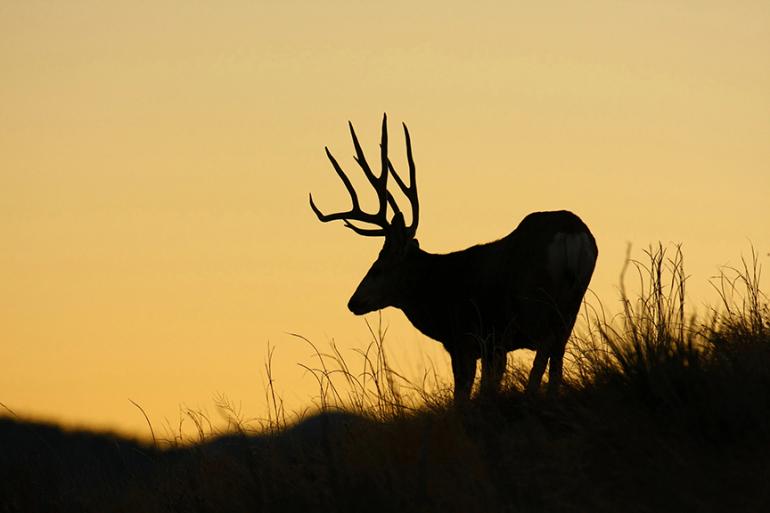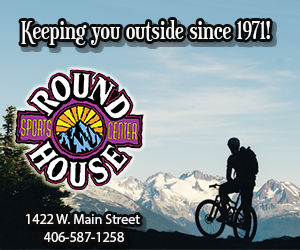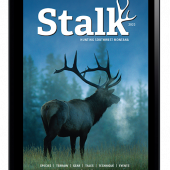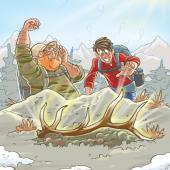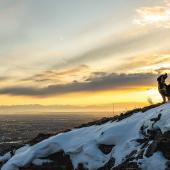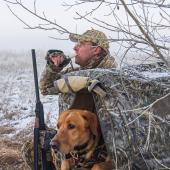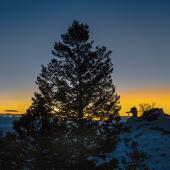Wild At Heart
We were hunting somewhere in eastern Montana, where the pulsing EKG of our state’s topography flatlines. The landscape is so flat, my dad would say, “if your dog runs away, you can still see him for a week.”
With the ink still wet on our hunter’s education cards, we’d spotted a herd of mulies with a decent rack of antlers poking up in the middle. Deer were never in any real danger with me behind the rifle, so my older brother had our father’s trusty 7mm-08 shouldered tight, laying in the cold dirt, breathing deep and slow. “Just squeeze it like a lemon, James,” my father whispered, squinting into the distance. “Just like a lemon.”
James’s slow, even breath clouded around the trigger one last time, and then the report crashed down, echoing, ringing for miles. The buck in my binoculars dropped flat to the ground, his harem scattering up the coulee. We hiked over, crunching through the dry weeds, Dad taking big strides to pace out the distance of the shot. “A three-point at 250 yards! Not too bad,” he said, clapping James on the back. They couldn’t have smiled any wider.
Dad talked my brother through each step of the field-dressing with care: carving out the musk glands, pulling his seven-inch Buck knife up the belly, splitting the pelvic bone with a hatchet. James followed along with his clumsy teenage hands, trying to keep the hot blood below his elbows—a real hunter keeps it below his wrists, my boy—and in about an hour, they were both tottering down to the creek, red arms held stiff out from their sides.
This was the closest I’d ever been to a wild animal. I grabbed a twisted branch of juniper and prodded the buck’s rubbery eye, its hanging tongue, the pile of its still-steaming innards resting on the cold November ground. The gross-out appeal was too powerful of a draw for my 12-year-old psyche.
“David, knock it off,” my dad said, appearing from nowhere to snatch the stick from my hand. He broke it over his knee and tossed it away. “You treat that animal with respect, you hear me?”
“Geez, Dad, it’s already dead,” I said.
“That doesn’t make any difference. We came into his home, and he was just trying to get by until we showed up. You leave him alone.”
“But it’s all so… weird,” I said, pointing to the viscera in the dry weeds.
“Your insides would look just about the same,” he said, giving me a hard paternal stare so I’d remember his words.
And now, 15 years later, I’m staring down a cow moose at twilight somewhere deep in South Cottonwood. Blood churns like a washing machine through my ears but my breath stays locked in my chest. There’s no gun this time, and the only thing resembling a lemon is the sour taste of adrenaline filling my mouth.
She points her mile-long face at me and stares. Gives a little grunt. Twenty yards between us? Twenty five? Not enough. Jesus, it’s big as a car. Maybe 500 pounds? More? Every moose-based disaster rushes through my brain, and my feet still refuse to move. Do you throw rocks? Scream? Play dead?
They’re just like us, just trying to get by. My father’s voice bubbles up through the years. You treat that animal with respect.
She gives one last look at me and lumbers off. She fades into the black trees, and by the time I fish my headlamp out of my bag, she’s disappeared. I take a long-overdue breath and sprint down the trail, smiling and shaking my head.
In this issue, we celebrate how connected we all are to the wildlife that surrounds us. We’ve got tales of chasing trout in clear blue lakes (p. 98), stumbling across hungry bears (p. 26), barely surviving run-ins with irate megafauna (p. 20), and plenty more. But whether you hunt game with a rifle or a camera, be sure to treat them with respect—we’re in their home, not the other way around. And we’re a lot more alike than you’d think.


